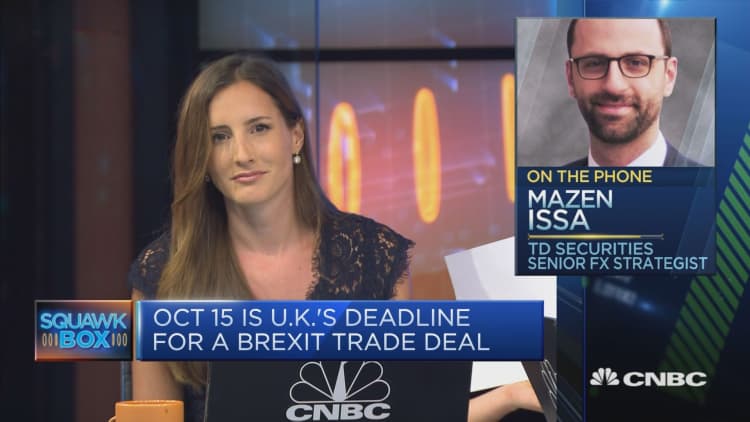LONDON — Sterling touched six-week lows against both the U.S. dollar and the euro on Wednesday morning after the U.K. revealed plans to renege on its Brexit withdrawal agreement with the EU.
By mid-morning trade in Europe, the pound was changing hands at around $1.2947, down 0.3% for the day and by more than 3% since the beginning of September. Benchmark one-month implied volatility has also spiked in the past week, mirroring investor concerns.
The euro gained another 0.25% against the pound, trading at around 0.9086 having appreciated more than 1.9% since the start of the month.
The British government is set to announce new details on its existence outside the European Union later on Wednesday, with a particular focus on the already agreed terms regarding Northern Ireland's customs relationship with the bloc.

The new legislation, dubbed the Internal Market Bill, sets out to amend the ways in which the British government can exercise authority over trade in its various jurisdictions, altering the existing Withdrawal Agreement signed in January. The government's Northern Ireland minister acknowledged on Tuesday that the move will break international law.
The bill has already prompted the resignation of the British government's top lawyer, with critics suggesting the U.K.'s reputation could be damaged by violating an international treaty in this fashion.
It will undoubtedly sour the eighth round of trade talks that commenced this week, and has raised the possibility of the U.K. leaving the EU without a free trade agreement in place when the Brexit transition period expires at the end of the year.
Nomura FX Strategist Jordan Rochester has ascribed a 40% chance of a "no-deal" exit, which could rise to 50/50 over time. He said in a note Tuesday that the full downside risk to sterling is not necessarily priced in just yet, and could extend beyond Brexit later in the year as the end of the U.K.'s furlough begins to affect the economy.
Rochester said the 3% fall for sterling is "nothing in the grand scheme of the pound," and highlighted that the EUR/GBP pair is yet to breach its recent ranges, in which Brexit was not a factor. In the near-term, Nomura is looking for EUR/GBP to climb to 0.92.
"The end of the furlough scheme in October is likely to raise unemployment from below 4% to anywhere in the range of 7.5-12%," Rochester said.
"That alone is likely to cause a substantial drag on UK growth. There is also the potential for a tax raise in the autumn budget and a long winter of COVID-19 cases and shutdowns providing a drag on activity too."
In addition, he argued that the risk of a no-deal Brexit at year-end could cause a "significant blow" to trading relations for "months and years to come," but highlighted that sterling has largely been brushing aside the key Brexit tail risks for weeks due to a range of external factors.

Stephen Gallo, European head of FX strategy at BMO Capital Markets, said Tuesday that the 0.91 area for EUR/GBP is likely to act as short-term resistance and attract better two-way flow, with tense negotiations stretching until October.
"Put differently, we would expect more FX investors to think about fading GBP weakness from that area on the expectation that the two sides will eventually reach a deal," Gallo said in a note.
"That said, this pair remains a difficult one to trade, since FX investors will not truly take the binary outcomes of a WTO Brexit (or a FTA) seriously until the very last minute."

